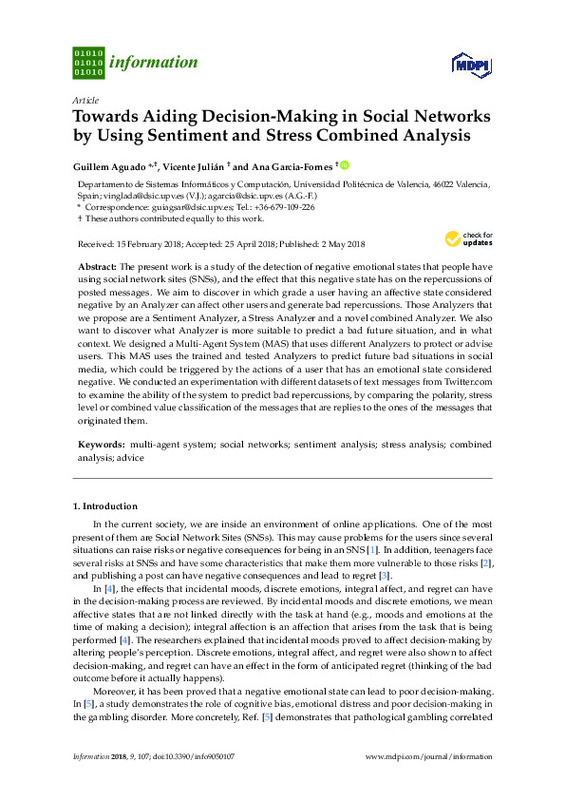JavaScript is disabled for your browser. Some features of this site may not work without it.
Buscar en RiuNet
Listar
Mi cuenta
Estadísticas
Ayuda RiuNet
Admin. UPV
Towards Aiding Decision-Making in Social Networks by Using Sentiment and Stress Combined Analysis
Mostrar el registro sencillo del ítem
Ficheros en el ítem
| dc.contributor.author | Aguado-Sarrió, Guillem
|
es_ES |
| dc.contributor.author | Julian Inglada, Vicente Javier
|
es_ES |
| dc.contributor.author | García-Fornes, A
|
es_ES |
| dc.date.accessioned | 2019-06-01T20:02:12Z | |
| dc.date.available | 2019-06-01T20:02:12Z | |
| dc.date.issued | 2018 | es_ES |
| dc.identifier.uri | http://hdl.handle.net/10251/121425 | |
| dc.description.abstract | [EN] The present work is a study of the detection of negative emotional states that people have using social network sites (SNSs), and the effect that this negative state has on the repercussions of posted messages. We aim to discover in which grade a user having an affective state considered negative by an Analyzer can affect other users and generate bad repercussions. Those Analyzers that we propose are a Sentiment Analyzer, a Stress Analyzer and a novel combined Analyzer. We also want to discover what Analyzer is more suitable to predict a bad future situation, and in what context. We designed a Multi-Agent System (MAS) that uses different Analyzers to protect or advise users. This MAS uses the trained and tested Analyzers to predict future bad situations in social media, which could be triggered by the actions of a user that has an emotional state considered negative. We conducted an experimentation with different datasets of text messages from Twitter.com to examine the ability of the system to predict bad repercussions, by comparing the polarity, stress level or combined value classification of the messages that are replies to the ones of the messages that originated them. | es_ES |
| dc.description.sponsorship | This work was supported by the project TIN2017-89156-R of the Spanish government. | es_ES |
| dc.language | Inglés | es_ES |
| dc.publisher | MDPI AG | es_ES |
| dc.relation.ispartof | Information | es_ES |
| dc.rights | Reconocimiento (by) | es_ES |
| dc.subject | Multi-agent system | es_ES |
| dc.subject | Social networks | es_ES |
| dc.subject | Sentiment analysis | es_ES |
| dc.subject | Stress analysis | es_ES |
| dc.subject | Combined analysis | es_ES |
| dc.subject | Advice | es_ES |
| dc.subject.classification | LENGUAJES Y SISTEMAS INFORMATICOS | es_ES |
| dc.title | Towards Aiding Decision-Making in Social Networks by Using Sentiment and Stress Combined Analysis | es_ES |
| dc.type | Artículo | es_ES |
| dc.identifier.doi | 10.3390/info9050107 | es_ES |
| dc.relation.projectID | info:eu-repo/grantAgreement/AEI/Plan Estatal de Investigación Científica y Técnica y de Innovación 2013-2016/TIN2017-89156-R/ES/AGENTES INTELIGENTES PARA ASESORAR EN PRIVACIDAD EN REDES SOCIALES/ | es_ES |
| dc.rights.accessRights | Abierto | es_ES |
| dc.contributor.affiliation | Universitat Politècnica de València. Departamento de Sistemas Informáticos y Computación - Departament de Sistemes Informàtics i Computació | es_ES |
| dc.description.bibliographicCitation | Aguado-Sarrió, G.; Julian Inglada, VJ.; García-Fornes, A. (2018). Towards Aiding Decision-Making in Social Networks by Using Sentiment and Stress Combined Analysis. Information. 9(5):1-13. https://doi.org/10.3390/info9050107 | es_ES |
| dc.description.accrualMethod | S | es_ES |
| dc.relation.publisherversion | http://doi.org/10.3390/info9050107 | es_ES |
| dc.description.upvformatpinicio | 1 | es_ES |
| dc.description.upvformatpfin | 13 | es_ES |
| dc.type.version | info:eu-repo/semantics/publishedVersion | es_ES |
| dc.description.volume | 9 | es_ES |
| dc.description.issue | 5 | es_ES |
| dc.identifier.eissn | 2078-2489 | es_ES |
| dc.relation.pasarela | S\376150 | es_ES |
| dc.contributor.funder | Agencia Estatal de Investigación | es_ES |








